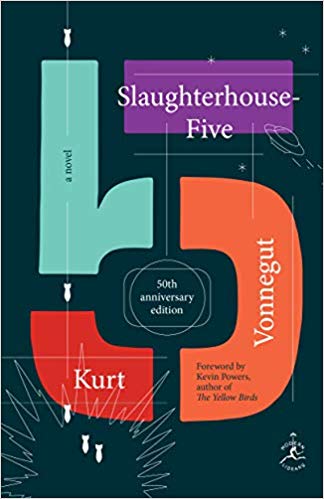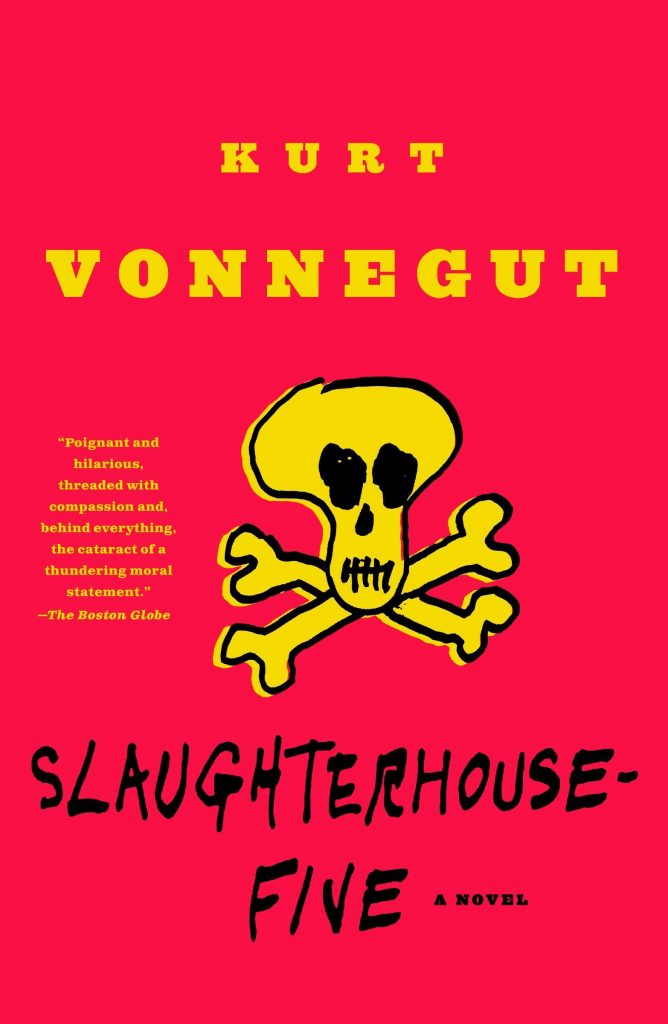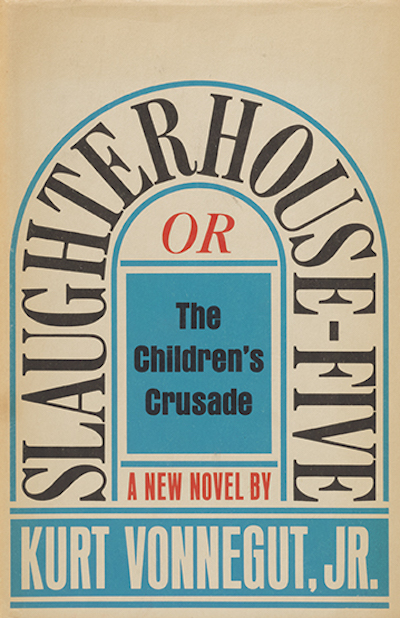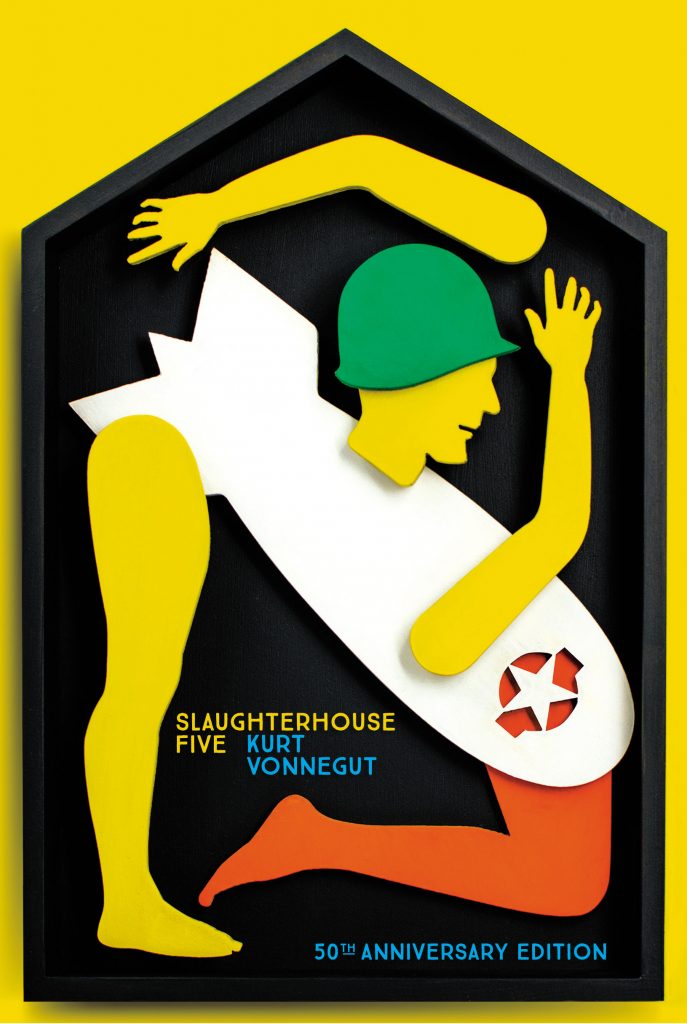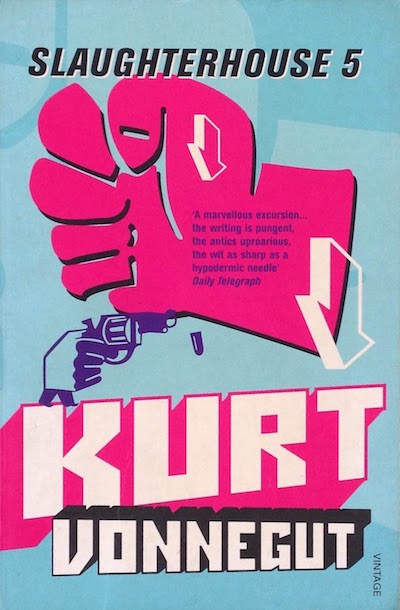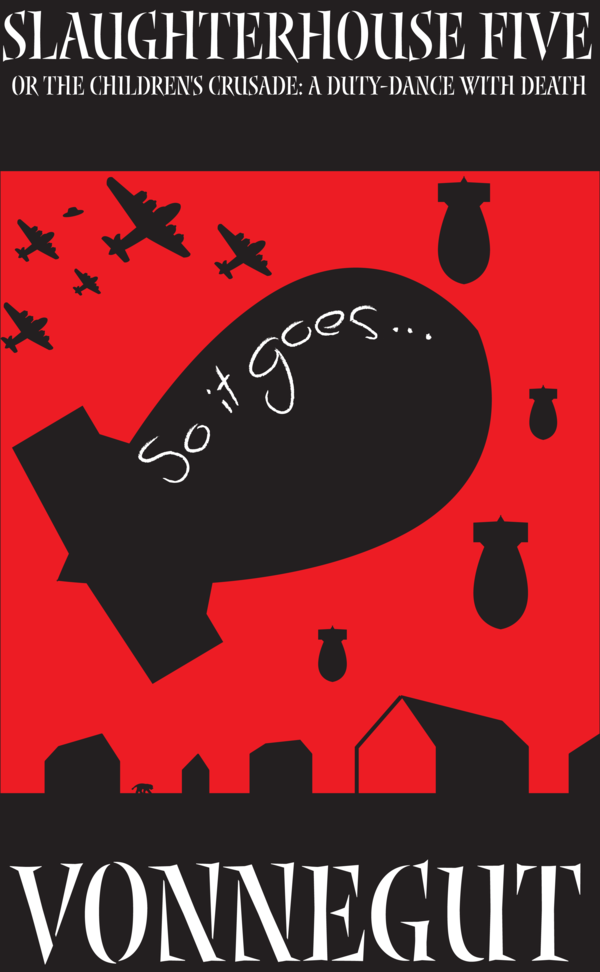Kurt Vonnegut’s satirical science fiction novel, Slaughterhouse-Five, follows protagonist Billy Pilgrim as he becomes unstuck in time and abducted by aliens called Tralfamadorians. First published in 1969 by Dell Publishing–over two decades after the bombing of Dresden, Germany–the book sheds light on the horrors of World War II by drawing comparisons to the Children’s Crusade, a failed crusade in 1212 aimed at taking back the Holy Land with an army of over 20,000 adolescents. The novel explore the concept of free will and the suffering of war. Vonnegut argues that all events are destined to happen before they occur, which is highlighted by Billy’s relationship with time. Because he cannot change anything about time, even though he is “unstuck”, there is no such thing as free will. This is backed up by his meeting with the Tralfamadorians, who proclaim:
“Why you? Why us for that matter? Why anything? Because this moment simply is. Have you ever seen bugs trapped in amber? […] Well, here we are, Mr. Pilgrim, trapped in the amber of this moment. There is no why.”
Through this, Vonnegut shows readers that humans are trapped in their own destiny. Though Billy is the protagonist, he is an anti-hero, proven by his resignation to his own fate. He is young, foolish, and mocked for playing the part of a soldier. Due to this, Vonnegut is able to make readers doubt the validity of war, making it seem foolish as it is mere children fighting battles that end in death and destruction. The writing’s resigned tone and the repetition of the phrase “so it goes” frame war as inevitable yet silly. Because of this inevitability of war and death, Vonnegut is able to make this lack of control horrifying to readers. These children pretending to be soldiers are merely pawns that lack control in their own life. The graphic descriptions of death and destruction resist the possibility of romantic interpretation.
Slaughterhouse-Five is widely celebrated as a modern classic, but has also been subject to its fair share of censorship attempts. Due to its use of obscene language, depictions of sexual acts, lack of patriotism, and mentions of homosexuality, the novel has undergone at least eighteen banning attempts in public school systems and libraries in the United States. Some of the bannings have been successful, such as the removal of the novel from Oakland County, Michigan public schools in 1972 and Missouri’s Republic High School in 2011. Slaughterhouse-Five was also the center of attention in 1973 when a school board president in North Dakota burned 32 copies of the novel in the school’s furnace in protest. One of the best-known attempts to ban Slaughterhouse-Five happened in 1982, when Island Trees Union Free Public School District removed a selection of books, including Slaughterhouse-Five, from junior high and high school libraries for being “anti-American, anti-Christian, anti-Semitic, and just plain filthy.” The appeals made it to the Supreme Court, where it was upheld that the school could not remove the book from libraries under the First Amendment.
Vonnegut has responded to banning attempts on multiple occasions. In a 1973 interview in Library Journal, Vonnegut said, “It’s the same thing every time. They ban something of mine, the ACLU jumps in, loses the case in the lower court, and wins the appeal. After all, they can’t win. What they’re doing is unconstitutional.” When Slaughterhouse-Five was burned in North Dakota in 1973, Vonnegut responded with a letter to the school board president, defending the novel as “not sexy” and “do not argue in favor of wildness of any kind.” In terms of the language, he argued:
“It is true that some of the characters speak coarsely. That is because people speak coarsely in real life. Especially soldiers and hardworking men speak coarsely, and even our most sheltered children know that. And we all know, too, that those words really don’t damage children much. They didn’t damage us when we were young. It was evil deeds and lying that hurt us.”
Despite the continuing attempts of censorship of Slaughterhouse-Five, the book has not fallen out of print. There are nearly 300 editions of the book, including translations into over 20 languages. It has been well-loved and critically acclaimed throughout the years, being nominated for the Nebula Award and Hugh Award, as well as being produced into the 1972 movie starring Michael Sacks.
About the Author
Kurt Vonnegut (1922 – 2011) was an American novelist known for his satirical style and postmodern techniques. He grew up in Indianapolis, IN where he wrote for his school’s newspaper in high school. He continued writing in college while attending Cornell University. He enlisted in the Air Force during World War II and was captured by Germans. He survived the bombing of Dresden, which became the focal point for his most popular novel, Slaughterhouse-Five (1969). He is also the author of 13 other books, including Cat’s Cradle (1963) and Breakfast of Champions (1973).
Further Reading
“Kurt Vonnegut’s Letter to the Man Who Burnt His Books”
“Kurt Vonnegut: Remembering a Hero of Free Speech”
“The Neverending Campaign to Ban Slaughterhouse Five”
